I normally would not hit your inbox so quickly again, but this message is time sensitive.
This past Saturday night, Rita and I attended the Lyric Opera performance of Baseball: A Musical Love Letter.
It was delightful. On so many levels.

The time sensitive issue: There are only three more performances. This coming Thursday (7:30), Friday (7:30) and Saturday (2:00). The performances are in the Michael and Ginger Frost Production Arts Building in the East Crossroads area – entrance at 18th and Charlotte.
The bigger issue: While I was working on this post, I learned that the online tickets were sold out. I have been advised that there may still be a few available for purchase, but you should call the Lyric rather than trying to buy online.
Even if you can’t make it to the show, I think a lot of you baseball fans will be interested in hearing about the playlist. Although I was familiar with some of the songs, there are several excellent baseball-themed songs I did not know about.
A key thing you should know is that this show is not in the form of an opera (not that there’s anything wrong with opera). It’s more like a Broadway musical with songs interspersed with narrative. The writing and organization of the narrative are superb – the writers have done their research. The songs comes from existing sources, including Broadway show tunes and pop songs.
The evening began with a welcome from Deborah Sandler, General Director and CEO of the Lyric. She noted that this is the Lyric’s first indoor performance before a live audience in over a year. That Covid thing. After thanking some key supporters of the Lyric, Deborah announced the start of the show with “Play Ball!”.
The cast of nine players (just like a baseball team) take up socially-distant positions around a diamond that forms the center of the stage. I’ll let Rita describe the actors: The cast of three women and six men gave a performance that soared, and rendered the experience, for a masked and socially-distanced audience, a marvelous treat to be “in the room where it happens.”
The songs and narrative are supplemented by vintage photos projected on the wall behind the stage. The first person you see is Abner Doubleday, the mythical founder of baseball at Cooperstown. We then got a clever lesson on the evolution of the rules of baseball (90 feet between bases, etc.).
The opening songs are about the early days. “What a Game” is from Ragtime, and the spitting habits of baseball players are a big part of the performance. We loved the lyrics in “The First Baseball Game,’’ which posits that baseball actually started in biblical times. I have since learned that the song was a 1961 tune sung by Nat King Cole.
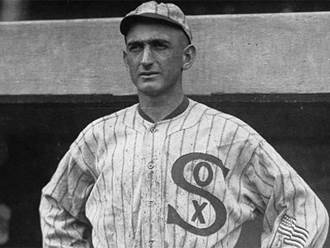
The next set of songs came from 1919: A Baseball Opera, a musical that premiered in 1981. The setting is the Black Sox scandal of 1919, and one of the songs is “Say it Ain’t So, Joe,” as in Shoeless Joe Jackson (above).
The show then turns to the Negro Leagues, beginning with the founding of the first league in 1920 by Rube Foster. Although not mentioned in the show, I thought it was cool that we were sitting just a few blocks from where Rube Foster founded that league – at the YMCA at 19th and Paseo. And about the same distance to the Negro Leagues Baseball Museum.
The Negro Leagues story was told with jazz of the era being played by the four-piece band that backed up the singers. There was good coverage of the Kansas City Monarchs. “Don’t Look Back” featured famous quotes from Satchel Paige, and by coincidence, so did the Hot Stove that went out last Thursday.
Special attention was given to the Monarchs’ Jackie Robinson and his signing by Branch Rickey of the Dodgers. The song “Did You See Jackie Robinson Hit That Ball?” was written in 1947, the year Jackie broke the color line.
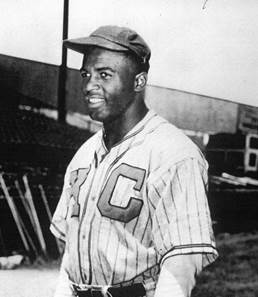
There are several quotes about Jackie from players and managers. I especially liked the one from Mickey Mantle, and so I looked it up. This was how Mickey described a visit to the clubhouse by Jackie after the Yankees beat the Dodgers in the 1952 World Series:
“After the game, Jackie Robinson came into our clubhouse and shook my hand. He said, ‘You’re a helluva ballplayer and you’ve got a great future.’ I thought that was a classy gesture, one I wasn’t capable of making. I was a bad loser. What meant even more was what Jackie told the press, ‘Mantle beat us. He was the difference between the two teams. They didn’t miss DiMaggio.’ I have to admit, I became a Jackie Robinson fan on the spot. When I think of that World Series, his gesture is what comes to mind. Here was a player who had suffered more abuse and more taunts and more hatred than any player in the history of the game. And he had made a special effort to compliment and encourage a young white kid from Oklahoma.”
The final show tunes come from the Broadway musicals Damn Yankees and Diamonds.
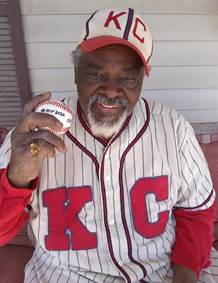
Then a featured artist hit the stage. Kansas City legend Danny Cox (above), in his booming voice, sang his composition, “The Ballad of Buck O’Neil.” It brought down the house – an enthusiastic standing ovation.
For the finale, the audience joined the cast in “Take Me Out to the Ballgame,” and as we left, we each received a box of Cracker Jack.

The show runs about 75 minutes without an intermission. But there is a “7th inning stretch” for the audience while the narrative informs us that this started in 1910 when President William Howard Taft was attending a game. He got up to stretch his large body and so the crowd did the same. May not really have been the origin, but it’s a good story.
A copy of the Lyric program is online. Click here.
Lonnie’s Jukebox (1) – Songs From the Playlist of Baseball: A Musical Love Letter: Below are earlier sources of five of the thirteen songs covered in the Lyric’s performance. Click on the song titles to listen.
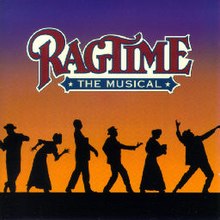
“What a Game” by the cast in a 2007 production of Ragtime. Spittoons recommended.
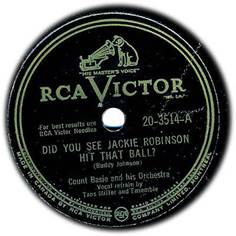
“Did You See Jackie Robinson Hit That Ball” by Count Basie & His Orchestra.

“Don’t Look Back” by Woody Mankowski. The song starts with a glossary of the names given by Satchel to his assortment of pitches. It then moves to many Satchel Paige quotes. Excellent photo montage in the video.
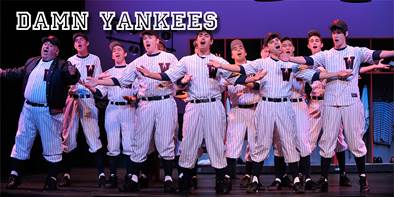
“(You Gotta Have) Heart” from Damn Yankees. A song currently applicable to the Royals, but hopefully only a temporary situation.
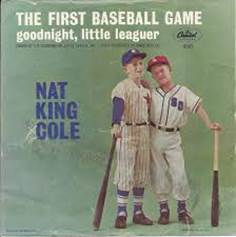
“The First Baseball Game” by Nat King Cole. This 1961 song was new to me. It has some fun lyrics:
My sermon today said the Reverend Jones is baseball and whence it came
If you take the good book and take a good look
You will find the first baseball game
It says Eve stole first and Adam second
Solomon umpired the games
Rebecca went to the well with the pitcher
And Ruth in the field made a name
Goliath was struck out by David
A base hit made on Able by Cain
And the prodigal son made a great home run
Brother Noah gave checks out for rain
Now old St Pete was checking errors and also had charge of the gate
Salome sacrificed Big John the Baptist who wound up a head on the plate
Delilah was pitching to Sampson when he brought down the house with a clout
And the Angel that day made a double play
That’s when Adam and Eve were thrown out
Now Jonah whaled and went down swinging, later he popped up again
A line drive by Nebuchadnezzar made Daniel warm up in the pen
Satan was pitching that apple
It looked though he might fan ‘em all
But then Joshua let go with a mighty blow and blasted one right at the wall
Shoutin’ come along and let’s play ball
Historical Note: Nat King Cole’s song reminds me of the Gary Larson Far Side cartoon that dates baseball even earlier than biblical times. A fish holding a bat has hit the ball out of the water and must find a way to retrieve it.

Lonnie’s Jukebox (2) – Lloyd Price: Switching gears, I want to take a moment to remember Lloyd Price, one of the rock ‘n’ roll stars from my high school days. Price died last week at the age of 88.
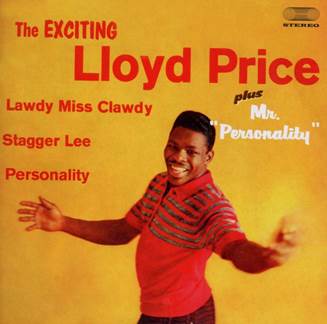
“Lawdy Miss Clawdy” (1952). This song was written by Price and was covered by, among others, Little Richard and Elvis Presley. Check out Lloyd and Little Richard singing it together in 1994 (click here).
“Stagger Lee” (1958). Stagger Lee was the nickname of Lee Shelton (no relation) who killed a man in a barroom in St. Louis in 1895. A legend and many musical versions of the incident followed. Price took his to #1 on the charts.
“Personality” (1959). Peaked at #2.
RIP Mr. Personality